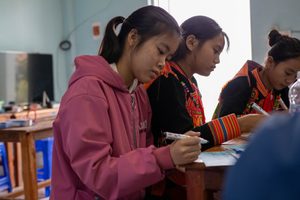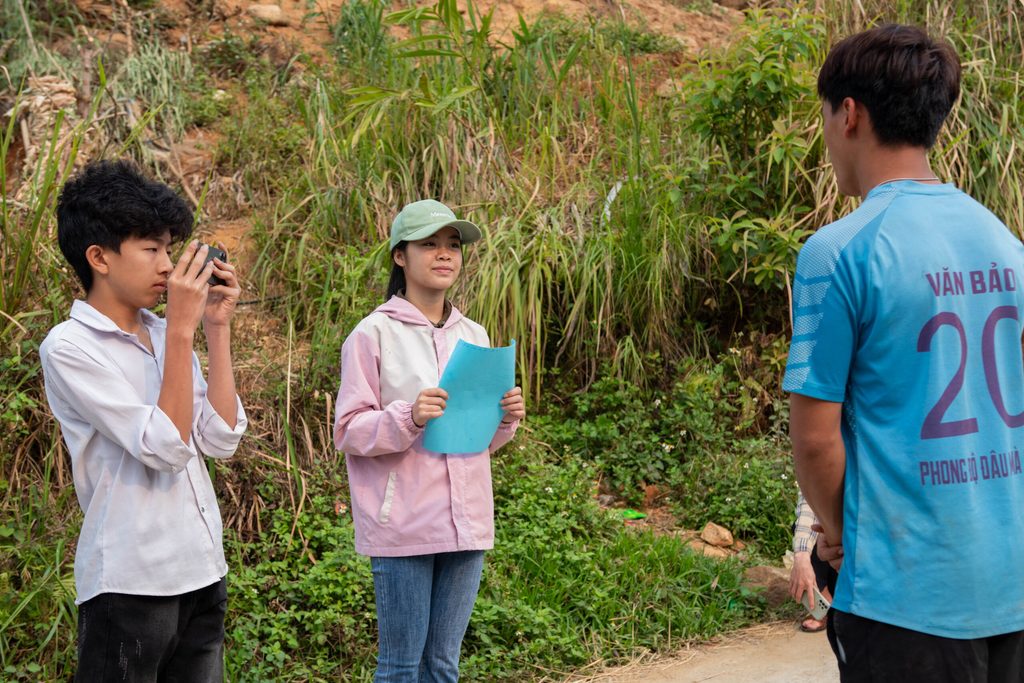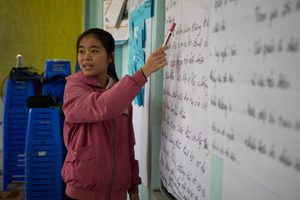The young reporter leading change against early marriage in her community
At just 15, Huyen is already a champion of change, leading many communication initiatives across Lai Chau province to eliminate child, early, and forced marriage in her community. "I am deeply moved by those who unfortunately had to get married before they were ready. They have been robbed of the chance to live their own lives."

Growing up in a poor ethnic family, Huyen understands the importance of education more than most. After helping with household chores and field work, she focuses her energy on her studies. With hard work and dedication, Huyen is top of her class and has won district and provincial awards for her academic excellence.
“I am lucky compared to many of my friends who had to drop out of school,” says Huyen. “It’s unfair because without school they can’t learn the skills they need to make a living, so they will continue to suffer, a fate their children will also face.”
Huyen’s natural charisma and leadership skills meant that she was often nominated to facilitate school events, and was eventually invited to join her school’s Champions of Change club. At the club meetings, Huyen learned about the negative effects of child marriage. “Early marriage is a vicious cycle and education is the only way to break it,” she says.
“Early marriage is a vicious cycle and education is the only way to break it.”
Huyen
Huyen realised that, as a member of the Champions of Change club, she could help others understand more about the harms of early marriage and contribute to the fight against it in her local area by using her communication skills to report on the issue and bring it out into the open.
Lai Chau’s young reporters

One of her ideas was to interview community members about their changes in awareness, attitudes and behaviour towards early marriage. “I like to listen to people’s stories. Maybe that’s why I like interviewing people,” says Huyen with a smile.
Huyen and her fellow Champions of Change brainstormed some interesting questions and practiced their interviewing skills, filming and smartphone photography. “I really enjoy working with this group because we each have our own strengths and we all try to make sure the interviews go well. When the team works so well together, it makes me feel very proud.”
The young reporters recognised the sensitivity of the issue they were covering, and knew they had to take the time to listen and understand the stories of those they were interviewing. “It is not enough to know about it, you have to really understand the consequences of early marriage. Only then can you encourage others to take action,” she explains.

Creative young media professionals

From the conversations Huyen and her friends gathered, they were able to develop a series of creative media activities at their school to raise awareness about early marriage, including dramas, short films, quizzes, drawing competitions, debates and slogan writing.
“How we communicate information plays a crucial role in engaging and inspiring our audience,” explains Huyen. “These communication activities not only appealed to children at school, but also to interested adults in the community.”
Since Huyen and her friends started raising awareness in their community, there have been some positive changes. “For the past 3 years, there have been no cases of students dropping out of school to get married early in my community,” she says proudly.
Teachers and local officials also note that parents are more supportive of their children’s education and no longer discriminate between their sons and daughters – previously, boys tended to stay in school while girls were taken away for early marriage or to work in the fields.
Steadfast towards the future
When asked about her future plans, Huyen says: “At the moment, my father is on kidney dialysis and I don’t know how I will be able to support my family. I just hope that I can pass the district school entrance exam so that I can go to boarding school and not be a burden on my family.”
Every journey begins with one step, says Huyen, adding that advocating for change is not difficult; anyone can do it. “I believe that simple initiatives like community interviews can encourage everyone to take action, big or small, to move forward on this journey.”
Youth activism against early marriage
Huyen is part of Plan International’s Time to Act! project, which supports youth leadership to end child, early and forced marriage. Young people from ethnic minorities are most likely to be subjected to early marriage, so they should be recognised as key actors in driving positive change against harmful social norms.
Implemented in Ha Giang and Lai Chau provinces from July 2021 to June 2023, the project supported 1,088 girls and boys from ethnic communities, aged 10-18, with knowledge and skills to build their confidence and ability to lead communication initiatives such as conducting community interviews, making short films, and dramas to advocate against early marriage in their communities.
Categories: Protection from violence, Sexual and reproductive health and rights, Youth empowerment



